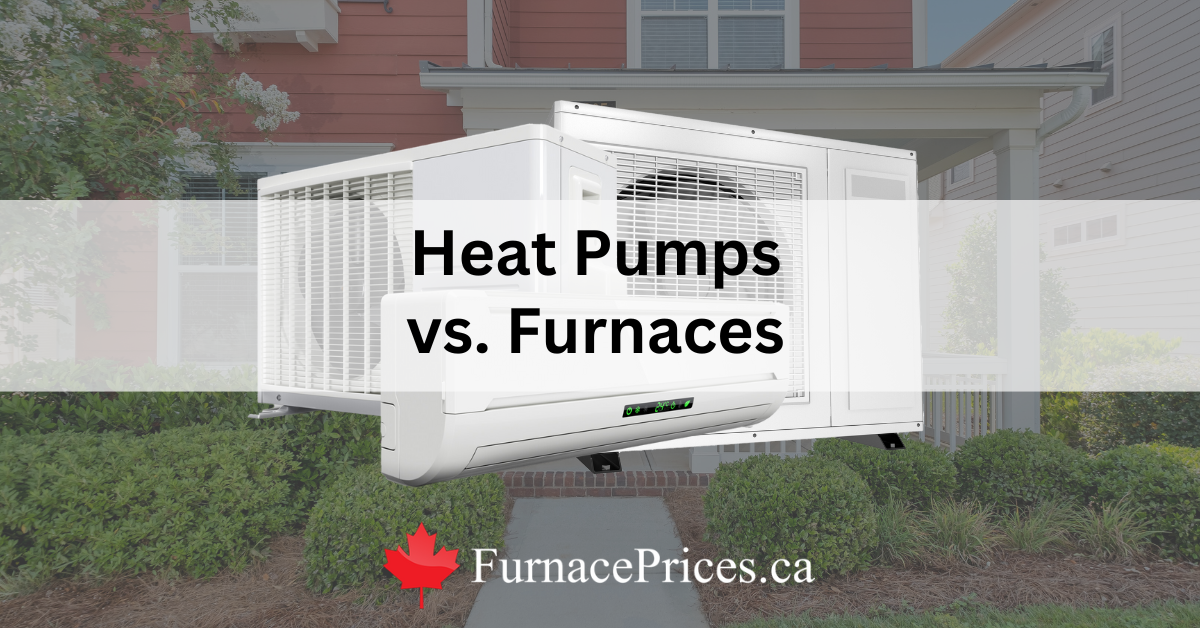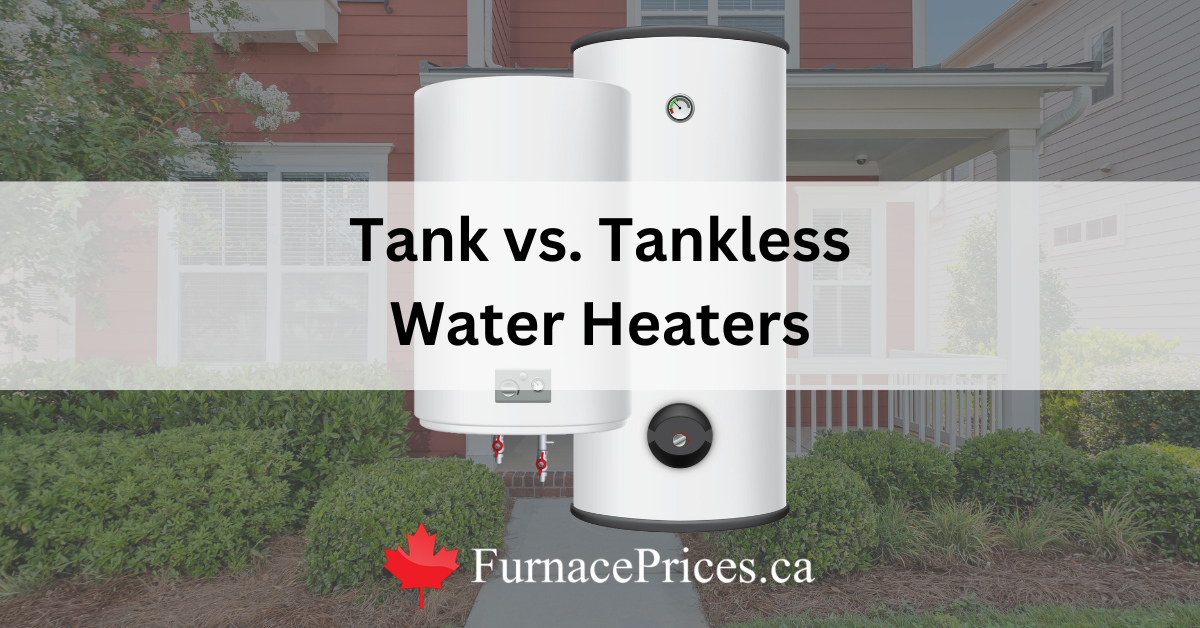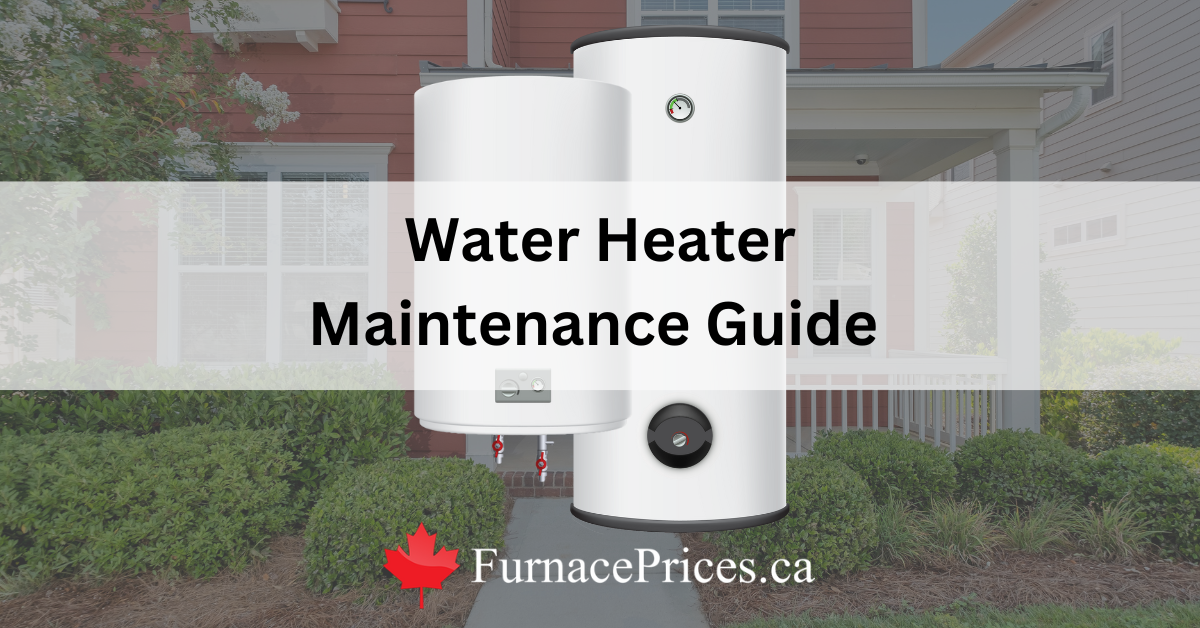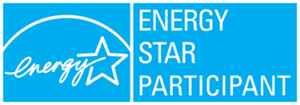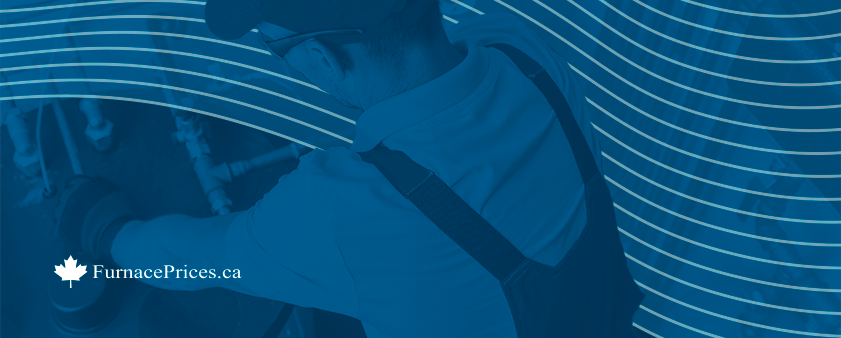
Are you interested in producing 200% to 300% more domestic hot water with the same amount of energy? This is the benefit offered by heat pump water heaters (HPWH). This article is all about helping you determine if this technology is for you. Of course, there’s more to consider here than just costs.
Heat pump water heaters are one of the most energy-efficient appliances you can have in your home. According to Energy.gov, heating water makes up 18% of a home’s electricity costs. Installing a high-efficiency HPWH, you’ll be able to curb more than half of that consumption.
The energy efficiency comes from the ability of HPWH to harvest heat energy from the surrounding indoor or outdoor air, then to concentrate that heat and transfer it directly to the water in a tank that supplies your fixtures. If you’re unfamiliar with this technology, this article will explore what a heat pump water heater is, how it works, and the pros and cons of using one to keep your hot water flowing.
Regular heat pumps can also heat your home, and are an excellent and very energy-efficient method of home heating.
See Also: Heat Pumps vs Furnaces
What Are Heat Pump Water Heaters?
Unlike conventional water heaters, a heat pump water heater uses electricity to transfer existing heat from air to water, instead of heating water directly using an energy source. Many homeowners now use heat pump technology to both heat and cool the air in their homes, and heating domestic water is an up-and-coming use for this same technology. While there are advantages to HPWHs, there are also disadvantages you need to know about.
How Do Heat Pump Water Heaters Work?
HPWHs work much like your refrigerator, but in reverse. While a fridge cools things down inside the appliance by moving heat energy outside the fridge itself, HPWHs harvest and concentrate heat energy from indoor or outdoor air, transferring this concentrated heat into a water tank that supplies your taps and faucets.
Heat pump water heaters make use of air from either indoor or outdoor spaces. A fan moves that air across a series of coils containing a circulating heat-transfer fluid called a refrigerant. This fluid picks up heat from that air, and circulates it to coils inside a water tank. The fluid is processed to concentrate the heat before it gets to those coils so it can release its heat to the water in the tank. The fluid is then returned to the heat-collecting coils, and the cycle of collecting heat from air starts all over again.
The Two Main Heat Pump Water Heater Configurations
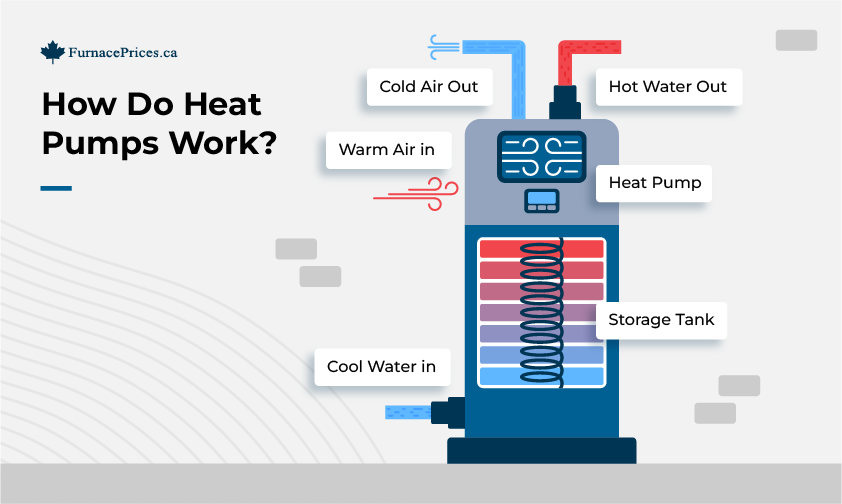
Heat pump water heaters can draw air from either of two sources: inside your home or outdoors. When installing a heat pump water heater, understand that it can only operate efficiently with access to air that’s between 4ºC to 32ºC (40º to 90º Fahrenheit). This is important and leads to two things to consider.
Scenario #1 – Your HPWH draws air from inside your home: This typically happens in a furnace room or utility room in the basement, so access to air of the right temperature is assured. The possible downside is that the HPWH will also cool the surrounding room where it’s located. After all, it needs to extract heat from somewhere.
Then there’s the issue of noise. Traditional water heaters are either completely silent or only make small amounts of noise. HPWHs make more noise – similar to a furnace operating.
Scenario #2 – HPWH draws air from outside your home: Hybrid models can operate with access only to outdoor air, but these units will change modes when temperatures are too low for efficient operation, using electricity in a resistance heating coil in the same way as a conventional electric water heaters do to heat water. This works fine when air temperatures are outside the working range, but you do lose some overall efficiency and your costs increase.
The Components of a Heat Pump Water Heater
Nothing beats a heat pump water heater for a straightforward home water heating system in some situations. Here’s a list of nine main components that make up heat pumps:
- Cold Water Inlet: This pipe brings cold water into the unit from your home’s main water line.
- Compressor: The compressor is situated on the top of the heat pump water heater. The compressor’s job is to pressurize the heat transfer fluid inside the system, raising the temperature of the fluid so heat energy can be transferred to your water via the condenser.
- Condenser: The condenser comprises the coils inside the water tank. The heated fluid flows through these coils and transfers the heat to the water.
- Evaporator: This component is located at the top of the heat pump water heater. It consists of a series of coils for the circulating heat transfer fluid, which warms up as the fan blows air over the coils. It allows the fluid to collect heat.
- Fan: You’ll find the fan at the top of the heat pump water heater. It pulls air into the evaporator from either indoors or outside, depending on the design.
- Drain: The drain valve is at the bottom of the heat pump water heater. It allows you to drain water out of the tank when needed.
- Hot Water Outlet: This pipe allows the newly heated water to leave the water tank and run to pipes used for showers, sinks, washing machines, dishwashers, and any other lines that require hot water.
- Insulated Tank: This tank is similar to conventional hot water tanks. Most heat pump water heaters typically come with a large water tank (50 to 80 gallons) to extend hot water delivery during times of heavy use.
- Thermostats: Thermostats are standard on all heat pump water heaters. One will measure the water temperature at the bottom of the tank, and another will measure the water temperature at the top of the tank. The thermostats work together to control the system so it produces more hot water or stops heating the water, as needed.
Heat Pump Water Heaters vs. Other Types of Hot Water Heaters
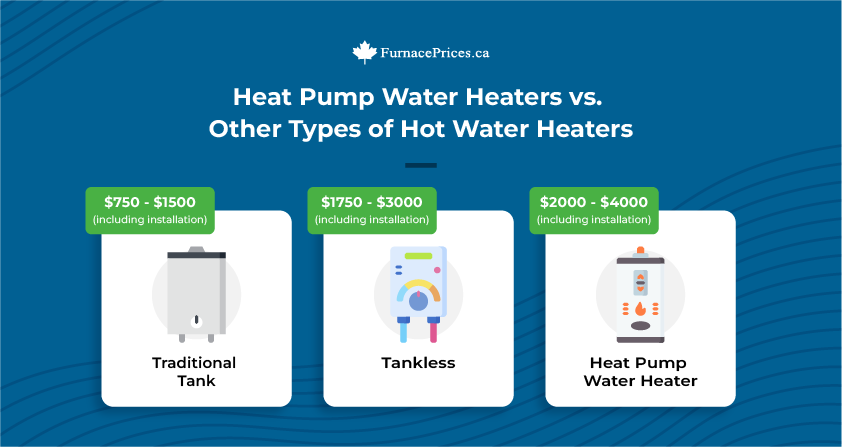
Although this article’s primary focus is on the technology of a heat pump water heater, let’s look at some of the other styles of more conventional water heaters available and how they function and compare.
- Conventional Storage Water Heaters: Also called a tank-style heater, these units have a large storage tank that uses either electricity, natural gas, or propane to heat the water directly. It fills with water as it’s used at taps and faucets, and keeps the water stored, hot, and ready to use at any time.
- Tankless/On-Demand Water Heaters: As the name implies, these systems don’t use a water tank at all. Instead, tankless water heaters heat water directly on its way into the pipes leading to your sinks, showers, washing machine, or any other appliances that require hot water. The main drawback of this system is that if you have a large family or guests over, you may not be able to supply enough water on demand for the additional people unless your unit is sized to handle the load.
- Solar Water Heaters: A very energy-efficient option, solar water heaters use the sun’s warmth to heat stored water. Unlike a traditional gas or electric water heater, solar water heaters are a good choice for the environmentally conscious homeowner. However, these hot water systems depend on the sun to heat the water, so even though they usually have large storage tanks, you could run into a problem if there’s no sunshine for a long period.
Cost of Heat Pump Water Heaters
Heat pump water heaters are more energy efficient than standard electric water heaters, but there’s more to consider than just efficiency. Upfront cost is something you should consider.
A standard, tank-style 50-gallon electric water heater may run you anywhere from $1,250 to $1,750 installed. A heat pump water heater costs significantly more at around $3,000 to $4,500, which is on par with most tankless water heaters.
If you choose an ENERGY STAR®-rated heat pump water heater you may qualify for a federal tax incentive or a state-sponsored rebate, which could save you hundreds of dollars on these home energy upgrades.
Once you’ve paid the initial cost of installing a heat pump water system, these systems begin to save money immediiately by saving energy. These savings could translate to hundreds of dollars a year when you compare them to the costs of running a traditional electric water heater. It takes about 8 to 10 years of use for an HPWH to recoup its higher purchase price.
Pros of Heat Pump Water Heaters
When we compare heat pump water heaters to conventional water heaters, energy efficiency is just one of the positive aspects of this type of technology. Here’s why you might purchase a heat pump water heater.
#1. More Efficient
As mentioned, a heat pump water heater is more energy efficient than conventional electric water heaters. The main reason for their high energy efficiency is that they don’t rely on other energy sources like gas or propane to generate heat directly. Instead, a heat pump water heater collects heat energy from air inside the home or the outdoors and transfers that heat to your water supply. Transferring heat takes much less energy than creating the same amount of heat.
#2. Tax Incentives and Rebates
Saving money is always a good thing. By installing a heat pump water heater, you may be eligible for government-sponsored sales rebates and federal tax incentives. This makes heat pump water heaters a cost-effective, energy-efficient choice for heating the water in your home.
See currently available government HVAC rebates.
#3. Environmentally Friendly
The energy efficiency of a heat pump water heater means they don’t use as much electricity as an electric water heater, or use gas which produces greenhouse gas emissions. According to energystar.gov, if all homes replaced their conventional water heaters with heat pump water heaters, there would be an annual cost savings of $12 billion and an annual reduction of 140 billion pounds of greenhouse gas emissions.
Cons of Heat Pump Water Heaters
Although energy efficiency and saving money are positive aspects of having a heat pump water heater, there are a couple of drawbacks. Let’s look at some things that may not make installing a heat pump water heater in your home the best choice.
#1. Efficiency decreases substantially during cold weather
Since heat pumps work by collecting heat energy from ambient air, this could pose a problem in colder climates, particularly for models drawing heat from outdoors. In colder climates, many homeowners will use a hybrid or split system for their hot water by using a traditional electric water heater in combination with a heat pump water heater.
Hybrid HPWH models drawing energy from the outdoors will automatically switch to heating water with an internal heating element when outdoor temperatures drop. Using electricity will increase your water heating costs.
#2. Higher Upfront Cost
The initial purchase cost is one of the most significant issues with a heat pump water heater. Although they save money throughout the year from lower energy usage, installing a heat pump water heater system in your home can run anywhere from $3,000 to $4,500. This is a big jump from conventional water heaters’ initial cost, which averages about $1,250 to $1,750. Energy savings aside, that initial cost may hold many homeowners back from installing a heat pump water heater.
However, this can potentially be offset somewhat with government rebates where available.
#3. Noise Output
HPWH aren’t crazy-loud, but they do make enough noise that you’d want to have them located in a utility room, not in a main area of your home.
Some Things to Consider Before Getting a Heat Pump Water Heater
If you want to save money, and save energy, a heat pump water heater is the way to go. However, there are a few technical issues to consider before installing a heat pump water heater in your home.
Size and First-Hour Rating
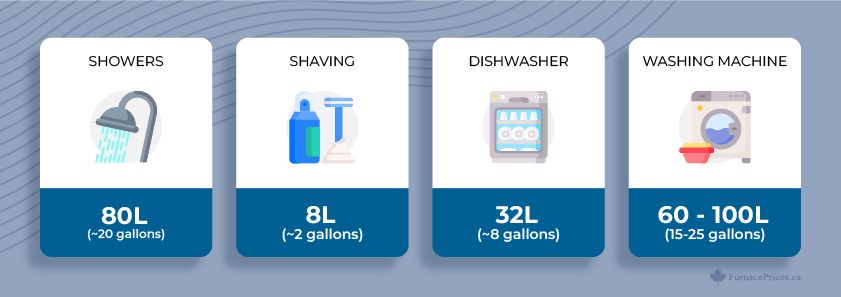
The first-hour rating and the size of the heat pump water heater can determine how well it will serve you. The first-hour rating calculates how much hot water is produced per hour (starting with a full hot water tank).
The EnerGuide label on a new heat pump water heater will give you all the information you need to determine if the model you purchase will work with your peak-hour hot water demand. The peak hour demand is based on your home’s highest use of hot water during a one hour period.
To calculate your peak hour demand, you simply take the busiest hours you use hot water in your home and then add up the average use for each of those activities in gallons.
Here is an average litre (and gallon) use for each activity, but the numbers below offer a general rule of thumb to follow for each day of consumption:
- 80 L (~20 gallons) for showers.
- 8 L (~2 gallons) for shaving
- 32 L (~8 gallons) for running a dishwasher
- 60 – 100 L (15-25 gallons) for using a washing machine.
Energy Efficiency
Determining the size and capacity of the HPWH you need is essential for proper performance. Knowing how much hot water is consumed daily will help you determine whether or not it’s adequate for your needs. When your heat pump produces too much water for your needs, you’ve spent more than you need to on the unit.
When it can’t produce enough hot water for your needs, cool showers is one result. Check the various makes and models of heat pump water heaters to ensure the best energy savings for your situation, without being too large.
Each heat pump water heater will have a Uniform Energy Factor that the manufacturer provides. This is a number based on the amount of hot water produced per unit and the amount of power consumed per day. The higher the energy factor number, the more energy efficient the heat pump water heater is.
Operating Cost of a Heat Pump Water Heater
One of the final things to consider when choosing a heat pump water heater over conventional water heaters is the cost. Heat pump water heaters provide substantial yearly savings compared to an electric water heater or even an energy-efficient gas or propane heating system.
As with any home appliance, you’ll have to compare the installation and appliance costs of the water heating system. You’ll also have to calculate the operating expenses of a high-energy efficiency heat pump water heater. By factoring in all costs, you’ll better understand what water heating system will work best for your home and your budget.
However, to truly know the operating costs of a heat pump water heater, you must also consider the cost of electricity in your area. If the electrical heating facility of your hybrid system will be used a lot because of low air temperatures at the heat pump water heater, and you have access to cheap natural gas where you live, you’ll need to do the math to see if a hybrid heat pump water heater makes economic sense.
Here’s an equation to use when you want to calculate your estimated operating costs:
The annual cost of operation = 365 days/year x 12.03 kWh / day ÷ EF (Efficiency Factor) x Fuel Cost ($/kWh).
A note about the equation – 12.03 kWh / day represents the average energy usage per day according to the Department of Energy test procedure for water heating systems for households of three people. You will have to determine your specific region’s average fuel cost (electricity cost).
The average electricity price in Canada is about $0.179 per kWh, although that varies substantially with Quebec being by far the cheapest and Alberta and the Maritime provinces at the higher end. The U.S. national average electricity cost in June 2022 was $0.154 per kWh.
Are Heat Pump Water Heaters Worth It?
Whether your old water heating system is causing problems, you’re struggling with high energy bills, or you’re considering upgrading, a heat pump water heater may be a good option. Heat pump water heaters don’t rely on fossil fuels like a gas furnace, so you won’t have the extra expense of burning fossil fuels and the potential for dangerous gas leaks.
The energy efficiency of a heat pump water heater is hard to beat. According to the Department of Energy’s Energy Star website, the average heat pump water heater can save a household up to $330 a year on electric bills. This means that heat pump water heaters can save you up to $5,000 over the average life of a tank-style water heater.
The only real drawbacks are running heat pump water heaters in colder climates and start-up costs. Pulling in the existing heat for a home in cold climates might be difficult for heat pump water heaters unless you have a semi-heated space for the appliance.
But suppose you live in cold climates and already have another water heater running on electricity, natural gas, or propane. In that case, you can combine the two water heating systems for endless hot water and still get substantial energy savings. Federal tax incentives and local rebates can offset initial costs.
A heat pump water heater is one of the best ways to make hot water in your home. Say goodbye to high electric bills and start exploring the benefits heat pump water heaters can bring to your life, the environment, and your bank account.
Talk to your local HVAC professional & water heater installation company today for more information on heat pump water heaters, the tax rebates available, and how a heat pump water heater can help you reduce costs and your energy use.
Frequently Asked Questions About Heat Pump Water Heaters (FAQs)
Are Heat Pump Water Heaters Worth Installing?
Yes, they can be. Although the initial cost may set you back a bit, when you can save around $300 per year, the heat pump water heater will eventually pay off that initial start-up cost.
Aside from financial savings, you’ll also experience energy savings with a greener water heating system that doesn’t need fossil fuels like natural gas or propane.
How Does a Heat Pump Water Heater Work?
A heat pump water heater collects heat in a recirculating fluid from an indoor or outdoor area. This fluid is processed to release the heat to water inside a tank, and recirculated back to absorb more heat. So it’s not creating heat, like burning gas, but just moving heat. The water inside that tank is available at your sinks, showers, etc.
What is the Difference Between Regular Water Heaters and Heat Pump Water Heaters?
A heat pump water heater doesn’t generate heat from an energy source. A heat pump water heater moves heat from one place to another. Through the magic of technology, it can take heat from a cooler place and move it to a warmer place. A regular water heater heats water directly by burning gas or with an electrical heating element.
Get Quotes
How soon are you looking to buy?*






